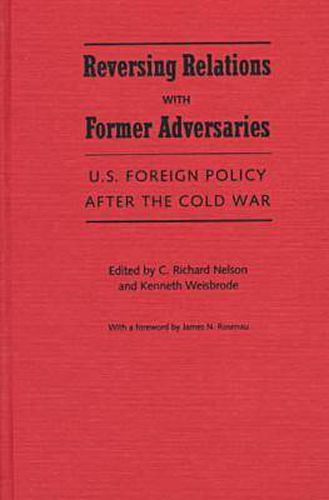Readings Newsletter
Become a Readings Member to make your shopping experience even easier.
Sign in or sign up for free!
You’re not far away from qualifying for FREE standard shipping within Australia
You’ve qualified for FREE standard shipping within Australia
The cart is loading…






A first-class systematic attempt to analyze U.S. foreign policy in the aftermath of the Cold War… . This book explores the complicated business that U.S. diplomats face in reversing adversarial relations and moving toward something friendlier and more positively productive. –Dario Moreno, Florida International University
This book was commissioned as part of the project on U.S. relations with Cuba at the Atlantic Council of the United States. It examines recent cases in which the United States attempted to rebuild a normal relationship with a one-time adversary. With a description of day-by-day and step-by-step plans and obstacles, it compares the process of normalization with Russia, China, Vietnam, and Nicaragua, and explores failed attempts with Iraq and Cuba. The cases provide insight into the complex domestic and foreign policy agendas surrounding normalization and shed light on the important post-cold-war phenomenon of making up with former enemies in ways that facilitate better ties over the long term.
Foreword by James N. Rosenau Introduction, by Burton M. Sapin Lessons from the Soviet Past, by Robert Legvold Normalization with China, by Robert Sutter Nicaragua: National Reconciliation and the Impatience of U.S. Policy, by William M. LeoGrande Vietnam: Detours on the Road to Normalization, by Richard T. Childress and Stephen J. Solarz Iraq: The Failure of a Strategy, by Bruce W. Jentleson U.S.-Cuba Negotiations: The Continuing Stall, by Pamela S. Falk
C. Richard Nelson and Kenneth Weisbrode direct the Program on International Security at the Atlantic Council of the United States in Washington D.C.
$9.00 standard shipping within Australia
FREE standard shipping within Australia for orders over $100.00
Express & International shipping calculated at checkout
Stock availability can be subject to change without notice. We recommend calling the shop or contacting our online team to check availability of low stock items. Please see our Shopping Online page for more details.
A first-class systematic attempt to analyze U.S. foreign policy in the aftermath of the Cold War… . This book explores the complicated business that U.S. diplomats face in reversing adversarial relations and moving toward something friendlier and more positively productive. –Dario Moreno, Florida International University
This book was commissioned as part of the project on U.S. relations with Cuba at the Atlantic Council of the United States. It examines recent cases in which the United States attempted to rebuild a normal relationship with a one-time adversary. With a description of day-by-day and step-by-step plans and obstacles, it compares the process of normalization with Russia, China, Vietnam, and Nicaragua, and explores failed attempts with Iraq and Cuba. The cases provide insight into the complex domestic and foreign policy agendas surrounding normalization and shed light on the important post-cold-war phenomenon of making up with former enemies in ways that facilitate better ties over the long term.
Foreword by James N. Rosenau Introduction, by Burton M. Sapin Lessons from the Soviet Past, by Robert Legvold Normalization with China, by Robert Sutter Nicaragua: National Reconciliation and the Impatience of U.S. Policy, by William M. LeoGrande Vietnam: Detours on the Road to Normalization, by Richard T. Childress and Stephen J. Solarz Iraq: The Failure of a Strategy, by Bruce W. Jentleson U.S.-Cuba Negotiations: The Continuing Stall, by Pamela S. Falk
C. Richard Nelson and Kenneth Weisbrode direct the Program on International Security at the Atlantic Council of the United States in Washington D.C.